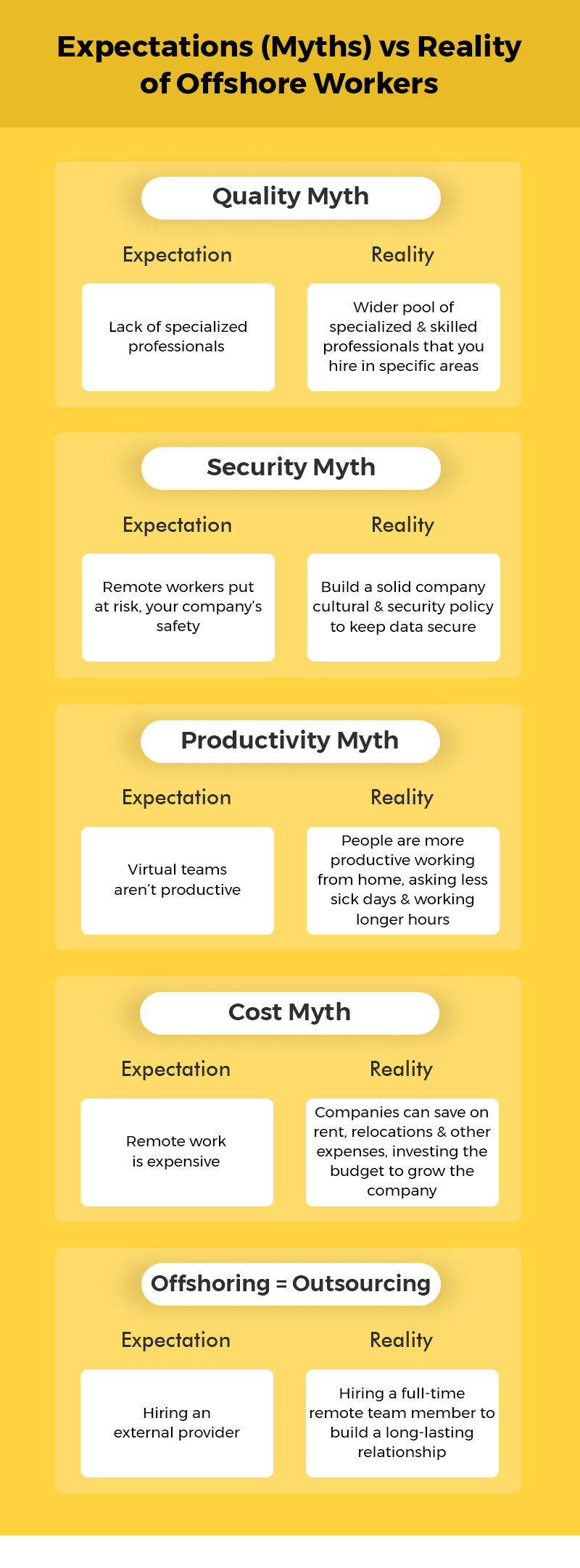Can we smash IT offshore workers’ myths?
Hiring remote workers has its share of myths and misinformation that can often cloud a company’s decision on whether or not to hire a remote workforce. Every business owner wants the truth when it comes to something as important as their workforce. And that’s why it’s essential to hunt down the truth instead of believing the myths. For us, this means a simple thing: smashing offshore workers’ myths.
Here Are A Few (Very Popular) Myths About IT Offshore Workers
Myth #1: Productivity Myth
Before the global pandemic, people thought that remote workers were unproductive because for many working from home meant working in PJs and taking 2-hour naps. Well, after a year and a half, CEOs and managers realized that’s not the case – but just a myth! Remote workers are productive when you set the right expectation, and a flexible working schedule doesn’t mean working from bed.
In addition, most people thought that working in different time zones meant slow delivery and little productivity. Once again, that’s not true! Surely, you need to put extra effort to arrange regular meetings during accessible hours and consider different timing when you need urgent deliveries. But finding better ways to get organized doesn’t mean being unproductive, just working in a distributed team!
Myth #2: Quality Myth
Poor Delivery: Another annoying myth about remote workers is that they don’t offer the same – high quality – work provided by the local staff. The truth is that, in this sense, remote hiring isn’t different from physical hiring. You need to go through the whole hiring process to find out who has the best skills for your project. You can hire a highly trained and experienced candidate or a very lazy one. The point isn’t if a worker is working locally or not. But how you structure the hiring process to pick the best candidate for you.
Just because the candidate you need is located offshore does not mean that they will lack in quality. On the contrary, you have access to the best possible IT talent for your company looking through more options.
Lack Of Proficiency: Another remote work misunderstanding is regarding English proficiency. We are all aware of the importance of internal communication in remote teams. And the sole idea of working with someone who doesn’t understand English sounds stressful. Well, in most non-English countries, people speak English fluently. India, for example, is full of talented professionals speaking English since they were born. Or, Eastern European countries offer highly specialized IT professionals and English proficiency. Poland ranks #11 on the English Proficiency Index in the world, while Ukraine and Russia claim a literacy rate of 99.4%.
Myth #3: Security Myth
After this never-ending lockdown, security is the top concern for business. According to the Cisco survey, 85% of respondents said that cybersecurity is a top priority or more important it was before the pandemic. In the Tessian’s Back to Work Security Behaviors report, 56% of employers believed that employees took bad security practices working remotely. In the same vein, 39% of employees that their security behaviors changed while working from home.
When the security risks can come from internal mistakes, the problem is in the company culture. To avoid those mistakes, you need to start before the hiring process. If you hire good people (not only skilled candidates), you will have loyal team members, whether on-site or remote. Explain to your candidates how you deal with internal documentation, and which is your security policy. In addition, you can rely on legal contracts even if your team is spread across the globe, so don’t let these fears stop you!
Myth #4: Cost Myth
After this pandemic, it’s easier to show why remote work’s high cost is a risk. According to Global Workplace Analytics, on average a company saves around $11,000 per year for each employee who works from home. For example, FlexJobs saved more than $5 million on real estate costs, transit subsidies and relocation costs, and continuity in the operations. During the COVID-19 pandemic, U.S. employers saved over $30 billion per day because of remote work.
Remote work is cheaper because you cut off on office rent, transportation, and some benefits. But it doesn’t mean hiring cheaper IT professionals. Remote models allow saving some costs that you can invest in other things to improve and grow your company.
Myth #5: Lack of Specialized IT Roles
One of the most common myths when it comes to hiring offshore workers is the idea that you can just pick from a pool of unspecialized workers to fill your specific corporate needs. When you need a specialist, you should hire a specialist – no matter where that specialist is located.
This idea that remote generalists can fill any roles set aside for specialists is like saying that you can use any ingredients you want when you bake a cake. Sure you can use any type of ingredient, as long as it is the right one for the cake you want to bake. Try to use salt instead of sugar to bake a brownie, and see if you get the same results.
The key to building a solid remote workforce is to have the specialists you need. You will save money from your budget, getting the exact services you need to help your company succeed.
Myth #6: Hiring Remote Workers Means Sending Jobs Overseas
There are two reasons why hiring remote workers does not mean that you are abandoning your own country in lieu of helping other countries grow. First of all, a remote worker can be located anywhere in the world. If you run an American company, you may be surprised to find out that many of these remote workers hired by American companies are Americans or based in the US.
In addition, instead of looking at replacing your current staff with remote workers, you should consider promoting your staff instead. Your current staff has its duties upon which you can expand by hiring offshore developers at a greatly reduced cost. Instead of causing upheaval for your current staff, you are actually creating more opportunities and alleviating responsibilities that make your domestic staff happy and likely more productive at their core tasks.
Last Myth: Offshoring = Outsourcing
Let’s clarify this. Outsourcing means hiring an external provider that gets the job done for you, like an agency or a freelancer. Hiring an offshore IT candidate means adding a member to your team despite the location.
Sometimes people mix up remote hiring with freelance services or external agencies. Outsourcing is one of the options, but not the only one you have. If you are running a specific or temporary project, outsourcing can be a valuable solution.
But hiring remotely, or offshoring means much more. You can have a stable and loyal team member based anywhere in the world. You can arrange regular meetings and video calls, and build a long-lasting relationship and a solid team.
Expectations (Myths) vs Reality of IT Offshore Workers

Take Your Company to The Next Level by Hiring IT Offshore Workers
Even after over a year of the pandemic when we all had to switch to remote work, some people have doubts. And smashing IT offshore workers’ myths is never an easy task. There are plenty of rumors and myths flying around about remote workers and, as the word ‘myth’ itself suggests, they are simply not true. For those who experience the transition during the pandemic, perhaps wasn’t the best moment to try it out. But that doesn’t mean that these myths are true.
Of course, you need to know where to look and how to interview candidates. More possibilities also mean more attention in the selective process. Take advantage of what offshore developers have to offer and get your company to the next level of success today. And for the hiring process, you can count on experts of the offshore recruitment world – DistantJob!






